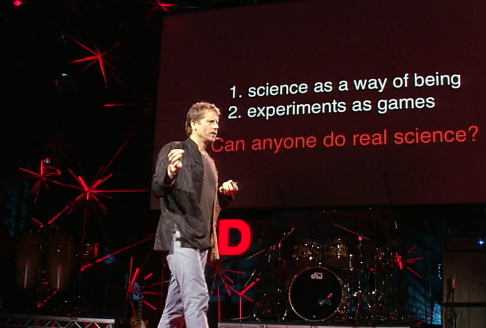So what is evolution's answer to the problem of uncertainty? It's play. Now play is not simply a process.
所以進化給出不確定性的答案是什么呢?那就是玩樂。玩不僅僅是一個簡單的過程。
Experts in play will tell you that actually it's a way of being. Play is one of the only human endeavors where uncertainty is actually celebrated.
玩樂的專家會告訴你,這其實是一種存在的方式。玩樂其實是贊頌不確定性的一種人類活動。
Uncertainty is what makes play fun. Right? It's adaptable to change. Right? It opens possibility, and it's cooperative.
不確定性讓玩樂變得好玩起來。對嗎?它會隨著變化而改變。對嗎?它開啟了各種可能。它是合作的。
It's actually how we do our social bonding, and it's intrinsically motivated. What that means is that we play to play. Play is its own reward.
實際上我們的社會也是如此連結的。同時它是動機是內在的,也就是說,我們是為了玩而玩。它自己本身便是一種獎賞。
Now if you look at these five ways of being, these are the exact same ways of being you need in order to be a good scientist.
現在要是你再看看這五種存在方式,你會發現他們和你成為一名出色科學家所需的特質是一樣的。
Science is not defined by the method section of a paper. It's actually a way of being, which is here, and this is true for anything that is creative.
科學并沒有一紙定義。它實際上是一種存在方式,它就在這里,也在所有好玩的東西身上。
So if you add rules to play, you have a game. That's actually what an experiment is.
所以如果你給玩樂加上規則,你就得到了游戲。而實驗其實就是這樣的東西。
So armed with these two ideas, that science is a way of being and experiments are play, we asked, can anyone become a scientist?
那么具備了這兩條概念,即,科學是一種存在方式而實驗是一種玩樂。我們問,是不是任何人都能成為一名科學家呢?

And who better to ask than 25 eight- to 10-year-old children? Because they're experts in play.
這個問題,去問25名8至10歲的兒童是最好不過了吧?因為他們是玩樂的專家。
So I took my bee arena down to a small school in Devon, and the aim of this was to not just get the kids to see science differently,
所以我帶著我的蜜蜂舞臺,去了Devon的一所小學校,而這件事的目的,不只是為了讓孩子們用一種不同的方法來看待科學。
but, through the process of science, to see themselves differently. Right? The first step was to ask a question.
更是通過這個過程,用不同的方法審視他們自己。對嗎?第一步,是提出一個問題。
Now, I should say that we didn't get funding for this study because the scientists said small children couldn't make a useful contribution to science,
說實話這個研究我們沒拿到任何資金支持,因為科學家們說這些小鬼頭無法對科學做出有用的貢獻,
and the teachers said kids couldn't do it. So we did it anyway. Right? Of course.
老師們也說小孩子做不到。不過不管怎樣我們還是做了。對嗎?肯定的。
So, here are some of the questions. I put them in small print so you wouldn't bother reading it.
好,這里是一些提出的提問。我把他們的字體縮小了,所以你們不用費神去讀。
Point is that five of the questions that the kids came up with were actually the basis of science publication the last five to 15 years.
關鍵在于孩子們提出的問題中,有五個問題事實上是過去5~15年間科學發表的基礎。
Right? So they were asking questions that were significant to expert scientists.
對嗎?所以他們在問的問題對于專業的科學家來說,其實至關重要。











